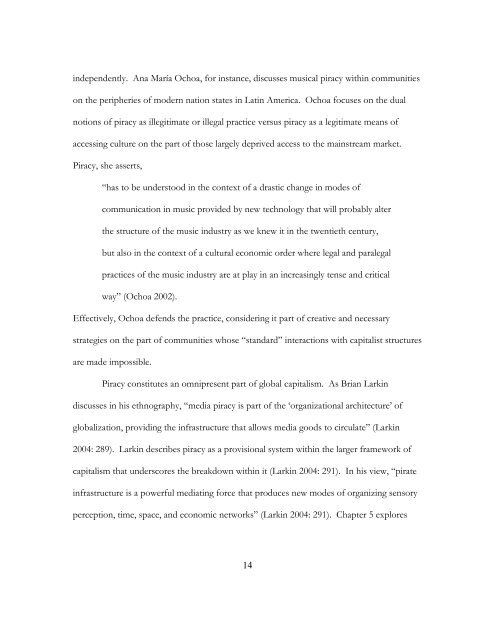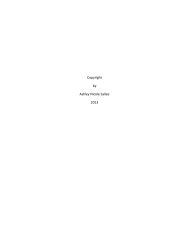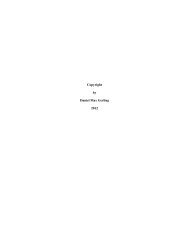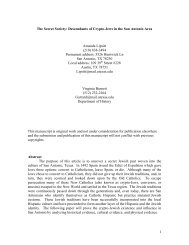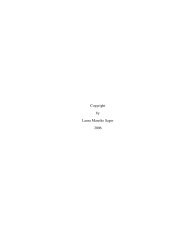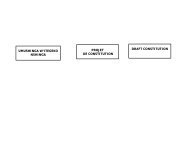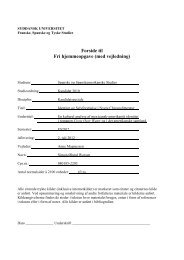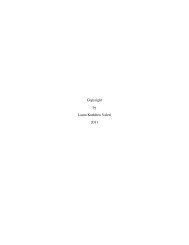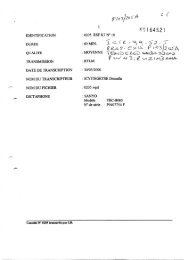- Page 1 and 2: Copyright by Kathryn Ann Metz 2010
- Page 3 and 4: Music from Amazonia: Roots, cosmopo
- Page 5 and 6: ACKNOWLEDGEMENTS I would like to th
- Page 7 and 8: to Mary Agnew, Mehdi Boudra, Patric
- Page 9 and 10: Music from Amazonia: Roots, Cosmopo
- Page 11 and 12: TABLE OF CONTENTS ACKNOWLEDGEMENTS
- Page 13 and 14: LIST OF FIGURES Figure 1: Map of Pe
- Page 15 and 16: CETA: Centro de Estudios Teológico
- Page 17 and 18: iquiteño/a: may be used as a noun
- Page 19 and 20: edoblante: small snare drum indigen
- Page 21 and 22: CHAPTER I: INTRODUCTION: THEORY AND
- Page 23 and 24: negotiated and experienced. Indigen
- Page 25 and 26: only within Iquitos. Los Solteritos
- Page 27 and 28: musical style from chicha, attempti
- Page 29 and 30: electricity is scarce as in several
- Page 31 and 32: concerns through discourse and the
- Page 33: group sentiments via rational-criti
- Page 37 and 38: formatting and programming to captu
- Page 39 and 40: Economic globalization always has c
- Page 41 and 42: that “Modernization diminishes th
- Page 43 and 44: of traditional, popular and often m
- Page 45 and 46: Reception Musical performances elic
- Page 47 and 48: years. Specifically, I draw attenti
- Page 49 and 50: Introduction Iquitos, Peru, located
- Page 51 and 52: “mythic personification of natura
- Page 53 and 54: mission and had returned to Quito.
- Page 55 and 56: Napo Rivers. 16 In the late ninetee
- Page 57 and 58: 2000:139). 20 Economic activity in
- Page 59 and 60: esponsible for overseeing the spiri
- Page 61 and 62: On October 23, 1851, Peru and Brazi
- Page 63 and 64: detrimental than actual combat; Chi
- Page 65 and 66: throughout the city. Classical musi
- Page 67 and 68: urned her alive (Collier 1968; Hade
- Page 69 and 70: 1942 until 1945, controlling rubber
- Page 71 and 72: enabled more frequent cultural exch
- Page 73 and 74: lood, cultural influences, or busin
- Page 75 and 76: Blurring the lines of this category
- Page 77 and 78: indigenous society in terms of a hy
- Page 79 and 80: Andean influence: Indigenism and mi
- Page 81 and 82: Shipibo and Bora peoples make up a
- Page 83 and 84: Many folkloric ensembles in Iquitos
- Page 85 and 86:
and modes of performance that have
- Page 87 and 88:
typically offering indigenous worke
- Page 89 and 90:
Musical categories: Andean dominanc
- Page 91 and 92:
Loreto has always been distanced fr
- Page 93 and 94:
CHAPTER III: PANDILLANDO AT CARNIVA
- Page 95 and 96:
throughout Latin America in which i
- Page 97 and 98:
nation. They do this by adopting cu
- Page 99 and 100:
Pandillando According to Iquitos mu
- Page 101 and 102:
a more syncopated rhythm with short
- Page 103 and 104:
El charapa buchisapa: Amazonian idi
- Page 105 and 106:
“Mix Pandilla 2007” Nuevamente
- Page 107 and 108:
The object is much greater and more
- Page 109 and 110:
had the means to support this effor
- Page 111 and 112:
Figures 9: Statue of Eliseo Reáteg
- Page 113 and 114:
Reátegui and his wife eventually f
- Page 115 and 116:
distribution in Iquitos and even in
- Page 117 and 118:
Reátegui and his musicians. Judges
- Page 119 and 120:
They set the rules and guidelines a
- Page 121 and 122:
In 2004, residents in San Antonio d
- Page 123 and 124:
Reátegui thrust both the pandilla
- Page 125 and 126:
Introduction CHAPTER IV: CUMBIA EXP
- Page 127 and 128:
From folklore to modern folklore Tr
- Page 129 and 130:
Chicha‟s instrumentation commonly
- Page 131 and 132:
province, toadas and tecno-cumbia b
- Page 133 and 134:
common man. To emphasize his love f
- Page 135 and 136:
I asked a number of working-class a
- Page 137 and 138:
A few concerned mumblings erupted a
- Page 139 and 140:
Explosión‟s operation contains a
- Page 141 and 142:
from the 1970‟s and his uncle wit
- Page 143 and 144:
Explosión often performs outside o
- Page 145 and 146:
tighter with some really good horns
- Page 147 and 148:
with holiday bonuses. This system h
- Page 149 and 150:
Explosión videos of pandilla conti
- Page 151 and 152:
fans. A number of factors undoubted
- Page 153 and 154:
on the idea that a „new culture,
- Page 155 and 156:
135
- Page 157 and 158:
Figure 18 Transcription of “Mix P
- Page 159 and 160:
Núñez: The pandilla. It‟s our o
- Page 161 and 162:
foreign music in its repertoire. Ev
- Page 163 and 164:
whether the tecno-cumbiaized pandil
- Page 165 and 166:
tall palm post, also purchased with
- Page 167 and 168:
The celebration I attended took pla
- Page 169 and 170:
Pandillando across the nation: Expl
- Page 171 and 172:
ceiling. Elevated tables littered w
- Page 173 and 174:
show, and most acknowledged their d
- Page 175 and 176:
Conclusion: Pandillando While tecno
- Page 177 and 178:
CHAPTER V: PUBLIC CULTURE IN URBAN
- Page 179 and 180:
media and recorded or live sound pe
- Page 181 and 182:
The city‟s physical isolation pre
- Page 183 and 184:
according to their social positions
- Page 185 and 186:
ock. In one sitting, as an example,
- Page 187 and 188:
dwelling may project a particular s
- Page 189 and 190:
The chichódromo: Predictable space
- Page 191 and 192:
Finally, the Navy marina in Punchan
- Page 193 and 194:
midnight. The crowd is thickest at
- Page 195 and 196:
such as “buchisapa” (an individ
- Page 197 and 198:
Peru, and those from other regions
- Page 199 and 200:
Audiences at the Complejo often cla
- Page 201 and 202:
more connected if the music they li
- Page 203 and 204:
esponded that, “It‟s who we are
- Page 205 and 206:
Verónica, my “host” sister, wh
- Page 207 and 208:
visited the capital everyone asked
- Page 209 and 210:
is designed to facilitate the excha
- Page 211 and 212:
from tracks recorded during live pe
- Page 213 and 214:
The local seller thus seems to be a
- Page 215 and 216:
well as a metropolitan stage” (Va
- Page 217 and 218:
CHAPTER VI: CONCLUSION: ANALYTICAL
- Page 219 and 220:
institutions of higher learning and
- Page 221 and 222:
could reveal alternate articulation
- Page 223 and 224:
The conservatory itself is highly r
- Page 225 and 226:
internet sites and podcasts are inc
- Page 227 and 228:
As Iquitos continues to develop, it
- Page 229 and 230:
Amazonian sound demonstrates their
- Page 231 and 232:
Bullen, Margaret. “Chicha in the
- Page 233 and 234:
Handler, Richard and Jocelyn Linnek
- Page 235 and 236:
McAlister, Lyle N. Spain and Portug
- Page 237 and 238:
-----. “Intento de aproximación
- Page 239 and 240:
Villarejo, Avencio. Así es la selv
- Page 241:
VITA Kathryn Ann Metz attended Wood


